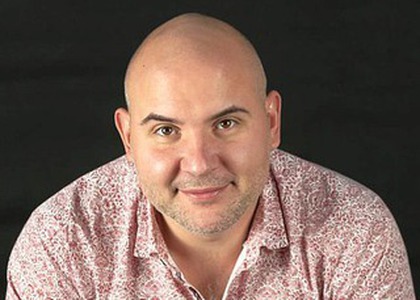> Interviews

Interview with Ovidiu Andriș, director of Banatul Philharmonic from Timișoara
On the 4th of October the Banatul Philharmonic from Timișoara opened its gates for the 2024-2025 season. Ovidiu Andriș, the chairman of the institution, offers us details about the events proposed to the audience of Timișoara.
Ovidiu Andriș, the season of the philharmonic of Timisoara opened last Friday with a concert held by the orchestra and the institution's choir led by the Austrian Sascha Goetzel, conductor in residence for the 2024-2025 season. How did this collaboration come about?
For us it was a great honour that maestro Goetzel managed to spare some of his time to be a resident conductor at Banatul Philharmonic. As you well know, we had other great resident conductors in the past. We had a collaboration with him last year and everybody welcomed him with open arms. It was an extraordinary collaboration. That is why I proposed to him this position in our institution and we are really happy that he has accepted it. As you have noticed we didn't just enjoy conductors in residence but also these resident artists such as: Florin Iliescu-violin, Brian Chang- cello, Simon Trecpski- piano and throughout our season we will also see Silvia Careddu- flute and Ionuț Podgoreanu- horn, also joining maestro Bebeșelea as guest chief-conductor.
Last season, the philharmonic received the award for Best Season at the MUSICRIT awards gala of The Critics, Editors and Musical Producers Union of Romania. What sort of events are you preparing for the audiences of Timișoara for the 2024-2025 season?
Firstly, I would start with this season's theme, Musical Journeys. We wish every event to be a musical journey through time, or space, either through different countries or different cities or why not, a journey into the future. I can only talk about events that are happening this year, but I am also thinking about the year 2025 when we are remembering, from our point of view, two great composers: George Enescu and Bela Bartok and together with maestro Bebeselea we will have two rather important events, We will present an opera concerto by Bela Bartok and Oedipe by Enescu, played in Timișoara. It is the closing of the season that we will be having. Next month we are having the Musica Reicercata festival, which will have Jordi Saval as its main point, in a great concert on the 20th of November in Timișoara.
Among the philharmonic's activities in the coming period is the "Remus Georgescu" International Festival-Competition, which has become a landmark in the contemporary music scene in Romania. This year's edition if titled De Porfundis and it will take place between October 14th-27th and it will be based on Remus Georgescu's reflection: "music is born out of silence, it reveals itself to us step by step, it blooms in time and then goes out again in silence". How is this year's programme designed?
The programme designed this year was built around the theme of De Profundis, idea which you have read earlier and it was also built around a great composer, also conductor, Thomas Ades, who will arrive in Timi;oara on the 25th of October where we will play mister Remus Georgescu's work Oratory "De Profundis" for soloist, mixed choir, children's choir and orchestra, alongside which we will also have works by Kurtag, Boulez and of course a piece of work by mister Ades. It was very important to us, since this is the 11th edition of the festival, it turned from Festival "Intrada" into Festival "Remus Georgescu" two years ago, trying to leave behind a lively memory of the maestro which meant so much to our institution, but also for the younger composers from the city and from the country and somehow we always try to reach many more areas. First of all, we have a composition contest, for example, this year we had over 240 entries for this contest and I am glad to say this. I am saying this to emphasise the level which this composition contest and workshop have. Six of them are coming from Timișoara and they, in a way, spend a week with mister Ades and alongside us they they compose pieces for the public spaces of Timișoara, and on the 27th, all these pieces of music will be part of a travelling concert in which the audience travels to all the six places and discovers these pieces especially composed for the public spaces of Timișoara and somehow these show us a reminder of all the things that can be composed today.
Contemporary music is a genre that can seem difficult for some listeners. How did the public relate to this type of music through the last editions of the festival?
Certainly, contemporary music is a genre that, first of all, must be explained and somehow we must know the context in which the composer wrote that specific piece or those specific pieces. Yes, for us it's a world of avantgarde, for the audience's ears which listens to Mozart it is of course a difficult thing, but I believe that the entire audience which finds itself around the festivals wishes to experiment and wishes to experiment with something new. Our main purpose is to stimulate the production of contemporary music and to stimulate the young Romanian composers to write works and I believe this is our mission with this festival and now we managed to stimulate even the international market having these young composers who come to Timișoara and I believe we managed somehow to gather around us the community of people who wish to experiment alongside us.
Translated by Sorana-Andreea Dumitrescu,
University of Bucharest, Faculty of Foreign Languages and Literatures, MTTLC, year I
Corrected by Silvia Petrescu














